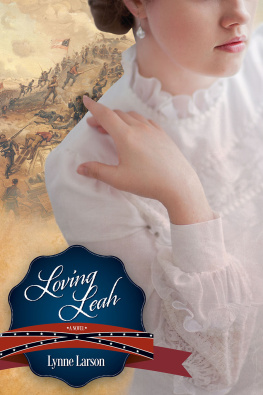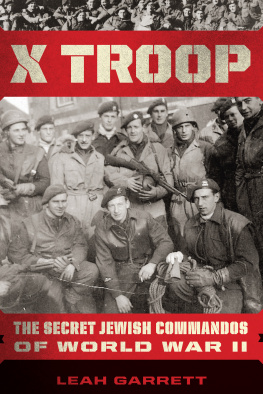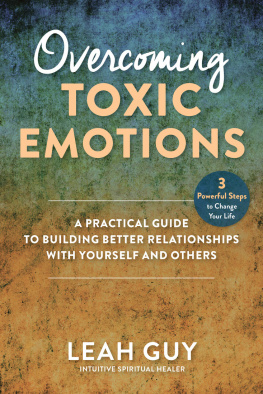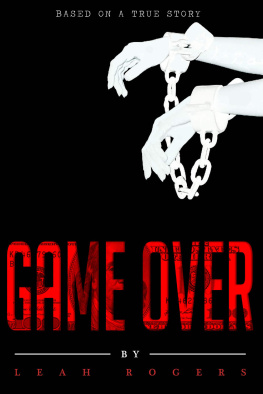Chapter One
I fell in love for the first time when I was fourteen years old and had the sense of a sparrow. Leah Donaldson was eighteen, I believe, and the most beautiful creature I had ever seen. She viewed me as a child, of course, and had no notion of my obsession. But my world changed when she became a part of it, and life would never be as it once was.
She came to work for us the winter of 1863, late in the season when the icy winds whistling across our Kansas prairie brought more than frostbite and bitterness with them. Leahs lovely presence stood in contrast to the leaden skies and the haunting fear that the war, stalled by cold and snow, would soon visit us again. There were no major engagements in Kansas during the Rebellionno Gettysburgs or Antietams or Bull Runs. But our eastern counties braced themselves each spring for something more insidiousvigilantes, or Bushwhackers as we called them, led by men like William Clarke Quantrill, George Todd, or Bloody Bill Anderson, raiders from Missouri who wrapped themselves in the Confederate flag but were no more than brutal murderers preying upon the innocent. Leah, new to our county and coming from Iowa as she did, couldnt have guessed how specific the threats would be or the price she would pay because of them. She was a Mormon girl on her way to Zion. Her time with us was meant to be merely a stopping place along the road. Little did any of us know how fate would change those expectations.
Ive found a young woman to keep the house and see to your lessons while Im away, my father told us, and that was the first we heard of what a Mormon was.
We lived on the edge of Lawrence in a fine Victorian house that befit my fathers title, State Senator Stephen Pace, and we might have spent our days in pleasant contentmentevery summer watching the waves of Kansas wheat turn golden and feeling the vast blue skies draw us close to heavenwere it not for the troubled times that plagued us. Long before the war, political division and hatred over slavery bled Kansas of its innocence. The war only brought further bitterness as families sent their sons to battle and became sworn enemies of former friends who had chosen the other side. Such issues haunted all the border states, but they were particularly acute in Kansas, where crusaders like John Brown had already stirred up a hornets nest of local animosity.
My fathers politics and abolitionist convictions were well-known, and we were used to enduring partisan bickering if not occasional violence. But there was more trouble in the wind for us than just hatred over states rights and slavery.
My mothers death, coming quite suddenly and unexpectedly, turned our home into a solemn, mournful place and made the war, as bad as it was, almost an afterthought. She died at harvest time from an outbreak of typhoid that also took some of our neighbors. Mother struggled against the illness, I remember, reluctant to leave us, but she finally drifted off, knowing that my sister, Addie, was recovering from the same affliction.
My father came home for the funeral considerably shaken and left again almost immediately to rejoin the Kansas Fourteenth Regiment of the Union army. The war, then in its first year, seemed to be a welcome distraction, and we rarely saw him in the months that followed. He wrote letters and occasionally sent souvenirsbullet fragments, a captured Rebel flag, an insignia patchbut he seemed to prefer the clamor of the battlefield to the silence and sadness of a house that had lost its soul, as our housekeeper, Mrs. Kreiger, said. It was true. My mothers conspicuous absence cast a shadow over everythinguntil Leah Donaldson was literally dropped on our front porch.
The day before she came, my father sat with Addie and me in the parlor and announced the new arrangement, which had come about suddenly during one of his rare visits home. He was a broad-shouldered man, my father. That day, his long legs were bent and spread apart as he leaned forward in his chair, a hand on each knee, his heavy boots flat on the carpet. The war necessitates me being gone a great deal of the time, he began solemnly, directing his words mainly toward me, and Addie is of an age to require a womans gentleness. Mrs. Kreiger has done her part, but shes too old to keep up with Addie. I believe the girl Ive found will do that to my satisfaction and perhaps teach you a thing or two as well, Ethan. He paused, searching for something else to say, unaccustomed to domestic issues. Shes well traineda Mormon girl, Im told, lost from her people when the bulk of them were driven out west in the forties. Amos Willard brought her down from Iowa to be a nursemaid to his wife, but Sarah Willard wouldnt have a Mormon in her house. Those people have strange ways, she said, so Willard has been looking to find the girl another situation.
Whats a Mormon? I asked, wondering why my father would accept a strange woman that Sarah Willard had refused. My mothers death had left an emptiness; now a stranger was coming to make up for the loss, as far as that was possible, and she was already a refugee from someone elses kitchen.
The Mormons are a religious sect thats been beaten about from pillar to post because theyre different, my father answered simply. But Ive got nothing against them. This girl, Leah Donaldson, has certainly done no harm, and youre to treat her with respect no matter how she worships.
Why does Mrs. Willard think shes strange?
Sarah Willard is a fool, and there are plenty like her. See that youre not one of them, Ethan. Heaven holds no place for bigots.
I glanced quickly at Addie, who was peering wide-eyed at our father, confused by his bluntness. She was four years old, seldom spoke, and though oblivious to the meaning of most things, fully sensitive to tones. Her honey-colored hair and blue eyes made her almost cherubic, and her ever-present dimples always melted hearts.
Noting her bewilderment and with an effort at gentleness, Pa bent and touched her cheek. Youre not to worry, Addie. Papa will leave you in good hands. Then he turned back to me with sterner words. Could be this Mormon girl has more brains than Sarah Willard ever did. You let her teach you what she knows.
Yes, sir. I will.
Theyre Christian folk, these Mormons, he continued briskly. Nothing Leah Donaldson says is gonna hurt you. Ive seen the girl. Ive talked to her. The only thing strange about her is her good manners, which are severely lacking in the world today. See that you mind yours, Ethan, and youll do just fine.
He reached for Addie again and tousled her blonde curls as she giggled at his clumsy touch. With Addie, he sometimes tried to be just Papa although no tender gesture came easily for him, even with this little girl he loved. Because of her reluctance in speech, we sometimes wondered if Addie was impaired. But several doctors told us she was merely slow in attaining verbal skills and would come along perfectly in due time. My father attributed the delay to the shock of my mothers death, and he had developed a sympathetic patience with Addie that he had never offered me.
He smiled at her now, held her hand, and tweaked her chin. But it was difficult for him. All too soon he let her go, turning to me again with a somber, apologetic tone. Youre too old to be pampered, Ethan, and too young to cause much trouble. The Mormon girl is here for Addie, mostly, but I expect youll take to her. I suspect shes got a tender heart, and Lord knows, every motherless boy needs that.














